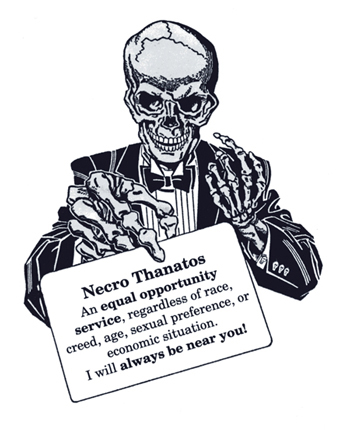thanato-, thanat-, thanas-, -thanasia, -thanasic, -thanatous +
(Greek: death, dead)
2. The study of the effects of approaching death and of the needs of the terminally ill and their families.
3. The study of death and its effect on individuals and families.
4. In forensic medicine, the study of the circumstances under which death occurred, especially as they relate to the production of postmortem phenomena.
5. The medicolegal study of death and conditions affecting dead bodies.
2. Death by means of autosuggestion.
3. An illness or death resulting from a belief in the efficacy of magic, a phenomenon observed among those primitive societies, or illiterate and superstitious people; who believe in the power of evil spirits, spells, curses, and control over one's bodily processes, with such belief and resulting fear manifesting itself as psychosomatic illness and even death.
There are also those who have a dread regarding the act of deceasing because it is the ultimate unknown factor or because a loved one will be missed very much.
It's not that I'm afraid to die. I just don't want to be there when it happens.

We all labor against our own cure,
even though death is the cure of all diseases.
2. An unwarranted apprehension of imminent death or a morbid dread of the subject of death or of dying.
2. Applied to a form of dwarfism that results in death.
A lethal dwarfism characterized by micromelia (condition of having disproportionately short or small limbs), bowed long bones, enlarged head, flattened vertebral bodies, and muscular hypotonia; lack of pulmonary ventilation causes respiratory difficulties with cyanosis (a bluish discoloration due to excessive concentration of reduced hemoglobin in the blood) leading to death within the first few hours or days after birth.
All cases have died at birth or in the neonatal period (first four weeks after birth).


